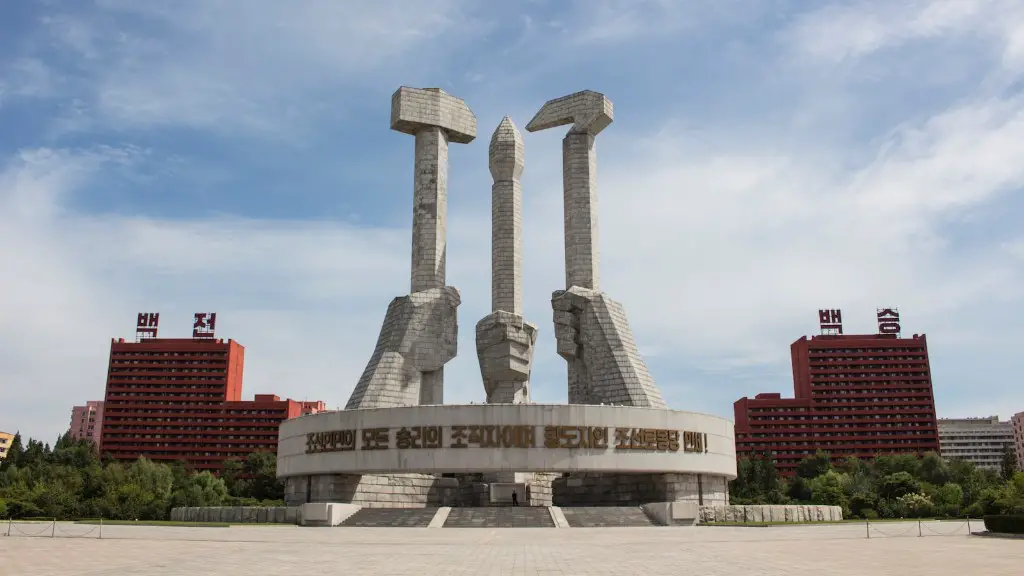History
The history between the United States and North Korea began in the 1950’s when the Korean War ended with an armistice, resulting in the division of the Korean Peninsula. Relations between the two countries have been strained ever since. Over the years, North Korea has repeatedly tested the US’s patience with nuclear threats and other provocations. In the last few decades, North Korea has become a focus of US foreign policy as the country has become increasingly isolated from the world and its citizens live in poverty and under oppressive conditions.
In 2017, the tensions between North Korea and the US reached an all-time high when North Korea fired ballistic missiles and launched four missiles, three of which landed in Japan’s exclusive economic zone. This prompted US President Donald Trump to order an aircraft carrier strike group to the region for a show of force. Later that year, the two leaders engaged in a war of words as Trump referred to North Korean leader Kim JongUn as “Little Rocket Man” and Kim called Trump a ‘mentally deranged US dotard.’
The Situation Today
The situation between the United States and North Korea remains highly tense, as both countries have expressed their readiness to deploy their nuclear capabilities. Despite the rhetoric, both countries have shown a willingness to negotiate and President Trump has expressed his desire to have a positive relationship with North Korea. In 2018, leaders of both countries met in Singapore for a historic summit to discuss denuclearizing the Korean Peninsula.
In 2019, President Trump and Kim Jong Un met for a follow-up summit in Vietnam, where North Korea offered to partially denuclearize in exchange for US security and economic concessions. However, talks eventually stalled and the two countries have not been able to reach a deal. The following year, Kim tabled the offer again and demanded that the US extend economic sanctions relief and sign a formal peace treaty. Since then, both countries have attempted to restart negotiations, but with little progress having been made.
International Implications
A conflict with North Korea is of great concern to many countries, not just the US and North Korea. North Korea’s close allies and trading partners, such as China, would likely be drawn into any confrontation and could potentially suffer the most. Any conflict with North Korea would also risk bringing US allies and partners into the fray, as North Korea has a long history of attacking other countries, such as South Korea and Japan, if it feels threatened.
The US also has a treaty alliance with South Korea that could be invoked if the North attacks, prompting a US response. Furthermore, a conflict with North Korea would have serious implications for the region, with other countries like China and Russia potentially getting involved. This could lead to a wider regional conflict with far-reaching consequences.
Legal Considerations
The legality of any US military action in North Korea would have to be considered. Under international law, the use of force can only be justified in self-defense or with the authorization of the United Nations Security Council. As of now, neither condition has been met in the case of any US-North Korean conflict.
Additionally, the US must also manage concerns from the public regarding any move towards military action. It is essential for the US to make it clear to the public the rationale for any potential conflict and how a strike against North Korea would align with US policy goals and its commitment to international law. Any military strikes must also be proportionate to the threat being posed by North Korea.
Possible Outcomes
If a conflict were to occur between the US and North Korea, the outcomes could be far-reaching and wide-ranging. If a US attack were successful, it could lead to the overthrow of the North Korean government and an influx of refugees into other countries in the region. This could destabilize the region and have a significant economic impact on the US’s allies.
Alternatively, if an attack were unsuccessful the US could suffer substantial casualties and economic losses. A failed military assault could also cause further regional instability, with countries such as China and Russia getting involved. Furthermore, it could trigger a global arms race as other countries build up their arsenals to counter the US’s military strength.
The Role of the US
Ultimately, any conflict between the US and North Korea must be carefully considered and the US must proceed with caution. While the US should not back down in the face of North Korean provocations, an overly aggressive stance could have disastrous consequences for the region. A more nuanced approach is necessary if the US is to successfully manage the situation.
The US has an important role to play in maintaining stability in the region and preventing a North Korean attack. This includes maintaining US presence in the region and working with US allies and other countries to contain North Korea. In addition, the US must continue to pursue diplomatic measures to reach a peaceful resolution to the conflict.
Diplomatic Solutions
There is still a chance that the US and North Korea can reach a diplomatic solution to their conflict. While the two countries have made little progress in recent years, they have both expressed a willingness to continue negotiations. The US must now focus on pursuing diplomatic options and continue to work with North Korea to reach a peaceful agreement.
The US has a promising opportunity to reach a peaceful solution with North Korea, but it must proceed with caution and care. The US must continue to pursue a diplomatic approach, engaging in dialogue and negotiations to find a resolution. Furthermore, the US must remain committed to international law and maintain public support for any potential military action in order to ensure it has the necessary political and international backing.
Sanctions
The US has also employed economic measures in its efforts to prevent North Korea from developing its nuclear weapons program, most notably through the imposition of economic sanctions. Sanctions have proven to be a powerful tool for the US and its allies in putting pressure on North Korea and curbing its nuclear ambitions.
Sanctions have had an impact on North Korea’s economy, with estimates suggesting that Pyongyang has lost over $10 billion in economic activity since 2017. It is unclear whether they will be enough to compel North Korea to denuclearize, but they have had an effect on the country’s economy and could potentially be the key to a peaceful resolution. The US should continue to utilize sanctions as part of its ongoing diplomatic efforts.
Conclusion
Ultimately, the US must proceed with caution when it comes to dealing with North Korea. The US has an important role to play in maintaining regional stability and ensuring that any conflict is contained. The US must continue to pursue diplomatic solutions and utilize economic measures, such as sanctions, to reach a peaceful resolution to the conflict. Any US military action must be carefully considered and approved by international bodies in order to ensure it aligns with international law and US policy goals.




